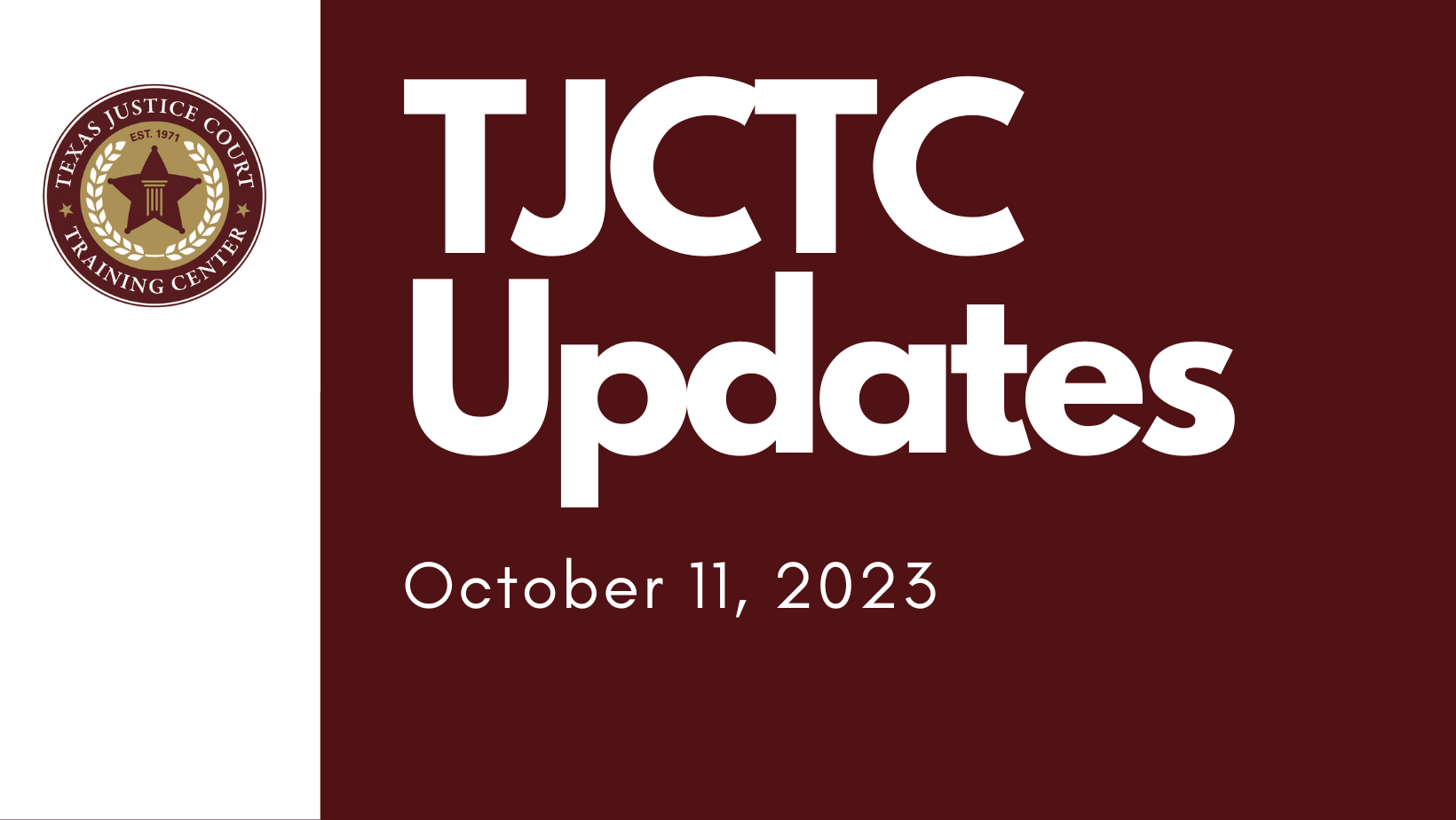Good Afternoon Judges, Constables, & Court Staff,
With February coming to a close, we wanted to share some more resources, updates, and especially some legal updates with you.
Updates from Legal
Warrant Teletypes
Can a judge magistrate on the teletype of a warrant, or do they need an actual copy of the warrant?
You are not legally prohibited from magistrating on a teletype when you do not have a copy of the warrant, but it is definitely a best practice to have the warrant. Teletypes can sometimes have incorrect information or not have enough detail, which can then result in errors in setting bail. Here are some examples of potential problems:
- You might not know if the warrant has been issued by the trial court judge (which would mean you are prohibited from making a bail decision) or by a magistrate (in which case you are required to make a bail decision), and this also impacts how the bail form is filled out in the PSRS.
- If the teletype says, “no bail,” it is not always clear if it is saying no bail is allowed or just that there is not a recommended dollar amount.
- Without the details from the warrant, you will often not have enough information about the circumstances under which the offense was committed, which is one of the factors that must be considered when determining bail.
These are just three examples; other problems could arise as well. So while it is not technically required, TJCTC recommends having a copy of the warrant to ensure that you make a good bail decision.
Texas Supreme Court Finalizes Updates for Rule of Judicial Administration 7
Earlier this week, the Texas Supreme Court published their final updates to the Rules of Judicial Administration regarding confidentiality policies. The new Rule 7.1 requires all courts (including justice courts) to develop a confidentiality policy and rules for training and distributing the policy to court staff. They also helpfully included their own policy which may be used as a model for other courts.
Upcoming Webinars
TAA Lease Update for 2024, hosted by TJCTC (1 civil hr.)
February 23rd from 10:00 – 11:00 a.m. TODAY!!!
Join TAA for a review of the latest version of its lease! This class will allow courts to fully understand the terms of the most commonly-used lease in eviction and other landlord-tenant disputes.
Registration link: https://txstate.zoom.us/webinar/register/WN_a5eSTV1pSg2vrIosPqOScA#/registration
Implementing SB4: Magistrate’s Order to Return, hosted by TJCTC
Feb 29th from 2 – 3:00 p.m.
Instructor: Bronson Tucker
This webinar will cover SB 4, taking effect on March 4th, which allows magistrates processing defendants charged with Illegal Entry into Texas to issue orders for the defendant to leave the United States. It is critical that magistrates follow the law precisely to avoid liability, and these issues will be covered in this critical course.
Registration: https://txstate.zoom.us/webinar/register/WN_3oUM3-19S4C40lTAYHqSRA
Impaired Driving Behavioral Interventions Around the Globe, hosted by The Impaired Driving Behavioral Interventions Interest Group
March 13 at 9:00 am Central Time
This webinar will highlight current evidence based impaired driving behavioral interventions conducted in Iran, Brazil, Canada, and the United States. An interactive panel will follow these presentations including:
- How best practices and effective interventions can be implemented across the globe.
- Where are the challenges to implement these strategies?
- What does research tell us about the effectiveness of pre-trial/pre-sentence interventions for the impaired driver population?
- Where are the gaps in training and education for these countermeasures?
- What impaired driving technologies can help with implementation of interventions?
Registration: https://us06web.zoom.us/webinar/register/WN_M1A93de1SOa9Nz1lIEmTzQ#/registration
National Center for State Court Updates
NCSC Releases New Guide to Mental Health Diversion
This guide is intended to serve as a resource framework for courts and judges to use to promote and implement diversion strategies for individuals with behavioral health needs in their communities. Ideally, judges would collaborate with a range of system stakeholders to examine the entire diversion continuum but could also focus on one step of the process at a time. This guide focuses on jail diversion systems, post arrest, and pre plea. NCSC also hosted a Mental Health Diversion webinar in December 2023 on “Lessons from the Field.”
Download from the NCSC website.
NCSC Inclusive Language Resources
NCSC updated the Gender Inclusive Language Toolkit to reflect the best practices learned since initially releasing it over a year ago. It has a fresh look and light restructuring, but the message is the same. Check it out!
Also, here is a sample benchcard for quick tips and best practices that you can download. While the bench card is primarily directed to judges, the guidance in it is applicable to all professionals in the legal field.
Finally, if you have not yet watched the Tiny Chat or webinar on the topic, they are great quick references.
Updates from the Judicial Commission on Mental Health (JCMH)
JCMH routinely sends out updates including resources and training that is helpful for justice courts. If you would like to get these updates, subscribe to their email list.
Update on Legal Calls
We have had a large number of calls finding their way into the wrong voicemail inboxes. Remember, please dial 512-347-9927 and press “1” for legal calls. If you don’t, the voicemails end up with our program staff who also have a high call volume. Often times your legal call messages end up lost in their inboxes and don’t get transferred to the legal team for several days.
As always, we are looking forward to seeing you at a program in the upcoming months. We have a very busy Spring full of education events for you lined up from TJCTC!
Thea & the TJCTC Team



